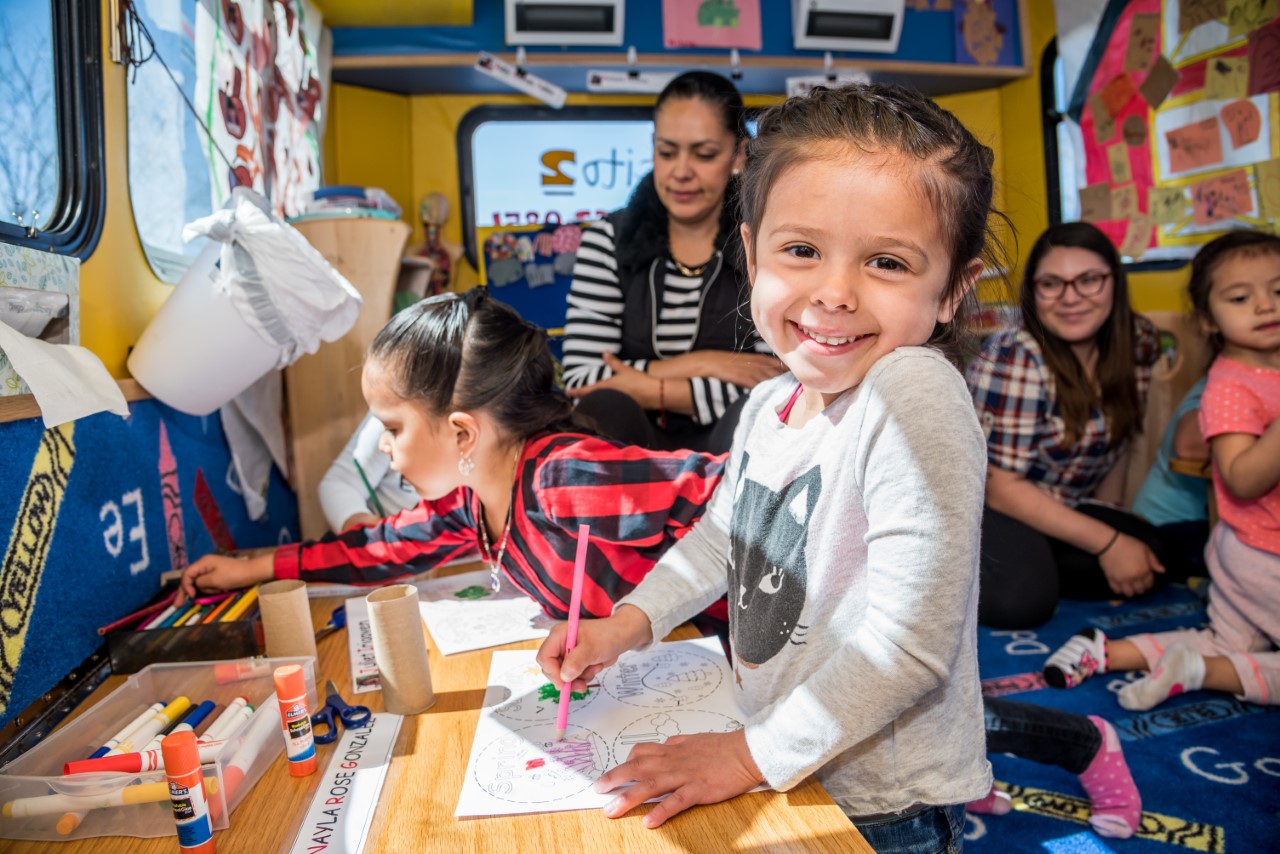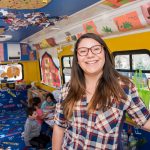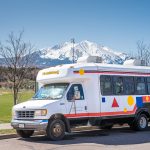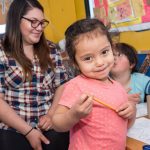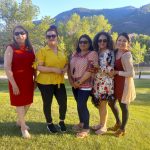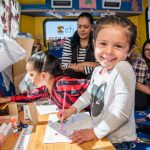When children hop aboard one of Valley Settlement’s El Busesito mobile preschools in Colorado’s Roaring Fork Valley, they’re taking a giant step into their future. The four brightly colored buses that ply their routes up and down the valley offer these 3, 4 and 5-year-olds a chance to play and interact with children their age, along with a high-quality bilingual education that will put them on equal footing with their peers when kindergarten rolls around.
Valley Settlement, an independent nonprofit that works to address the needs of immigrant families in the Roaring Fork and Colorado River Valleys, began in 2011 as a project of MANAUS, a social justice organization based in Carbondale, Colorado. Supported by a planning grant from the W.K. Kellogg Foundation, Valley Settlement sent bilingual, bicultural community organizers on a deep-listening tour of the valley’s low-income families to hear first-hand their experiences of living in this region that is home to the bustling resort community of Aspen and some of the highest levels of economic disparity in the nation.
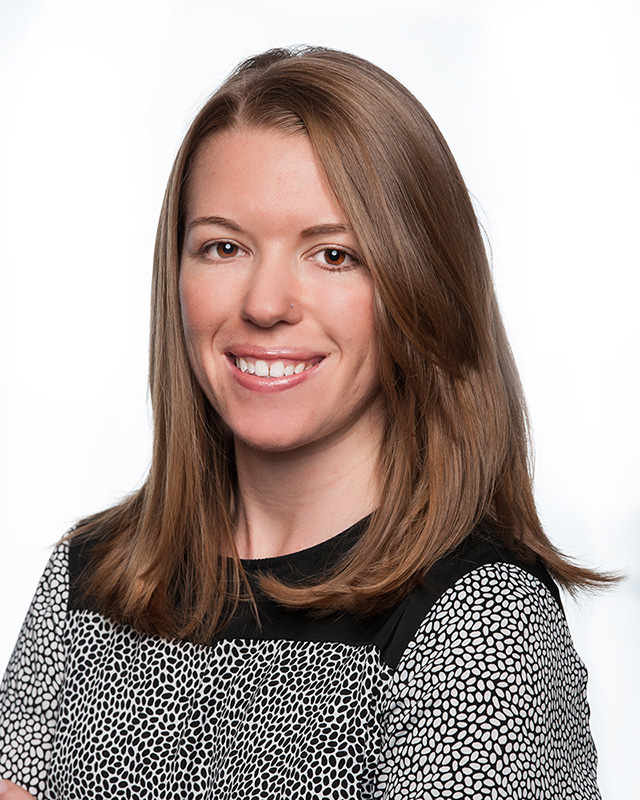
“The community organizers went door to door and spoke with folks over coffee at their kitchen tables, or went into churches and just had conversations about their lives and tried to deeply understand what their experience was in this community and what they wanted,” says Sally Boughton, director of Development and Communications. “At the same time, other staff went out and spoke to local service agencies to find out how they were reaching—or failing to reach—the Latino population.”
The organizers discovered that only 1 percent of age-eligible children were enrolled in a preschool program, with families citing transportation as a major barrier to their children attending school. Because the cost of housing in Aspen is completely out of reach for these working families (average cost of a single-family home in October 2022: $4.53 million), many end up moving to communities such as Rifle, nearly 70 miles from Aspen, a trip that can take at least an hour and a half each way—without snow or traffic. Responding to that concern, Valley Settlement developed its El Busesito (“little bus”) program, which now comprises four buses with two bilingual, bicultural lead teachers each traveling to take this free preschool to five different neighborhoods—making school within walking distance of most families. And yes, the teachers learn to drive the bus.
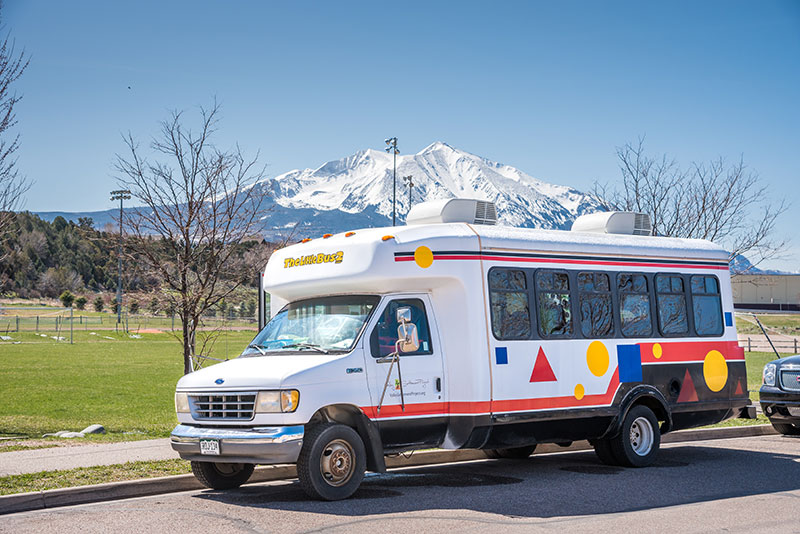
The mobile preschool program was only the beginning for Valley Settlement. In conversations with the immigrant families, organizers found that many with younger children didn’t know where preschools were or how to access them. Those who had children in the local school system didn’t feel that they could communicate with teachers and administrators at their children’s elementary and middle schools, and those who tried encountered a language and culture barrier. More than half the children in the valley are Latino, Boughton says, but most of the teachers and center staff in the community are monolingual English speakers—a situation that is beginning to shift but is still an issue. Parents felt uncomfortable going into their children’s school, felt uncomfortable trying to talk to their teachers, didn’t feel that they knew what was going on and didn’t have an administrator they could talk to about any of it.
In response to these concerns, Valley Settlement established the Parent Mentor program, a volunteer program that trains parents and community members to serve as a bridge between Latino families and local schools, supporting students one-on-one as well as supporting teachers in the classroom.
As these two programs grew, staff continued to ask and listen for what the community needed. What has evolved is not so much a network as un abrazo, an embrace that envelopes the community’s children with as much support as possible. It is two-generation programming that extends that definition beyond simply “children and their parents” to include the other lives that touch and support them.
Much of the children’s care is by relatives, neighbors or other community members who have the children during the long hours when their parents are working. Valley Settlement established the Family, Friends and Neighbors program to offer this cohort of women, some of whom have been providing child care in their neighborhoods for years, an opportunity for professional development. A two-year curriculum offers training in child development, educational enrichment and practices to make the child care environment safer, such as baby gates and childproof plugs on electrical outlets.
These providers have much more than full-time job, says director of Programs and Innovation Kenia Pinela, so the program had to be tailored to meet their needs.
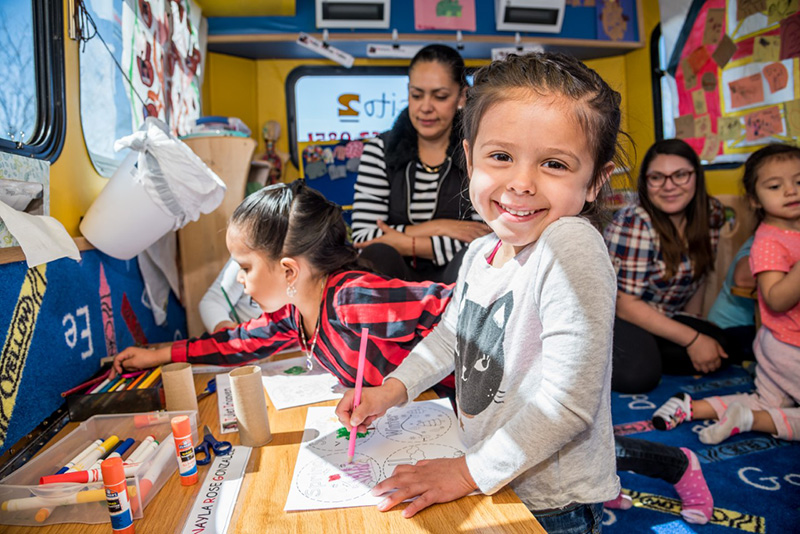
“We were trying to add coaching and mentoring on top of what they were already doing,” Pinela says. “Sometimes kids arrive at your home at 5 a.m. or 6 a.m. and don’t leave until 7 p.m.,” she says. “I realized early on that if we wanted to create a program that’s going to work for providers, we have to be there in that controlled chaos when the kids are in their homes.”
The providers themselves created the curriculum out of questions they wanted answered, such as child development, social-emotional topics for the kids and mental health topics for themselves. The program also discusses business topics, so the women begin thinking of what they’re doing in terms of running a business. The curriculum also provides much of what will be required if the providers decide they want to go through the process of becoming licensed.
Listening is at the core of all of Valley Settlement’s programs, all which centers around what it takes to have children’s lives flourish. The reality is that children can’t have great lives in isolation, so serving their families and the larger community becomes the mission, too.
- Learning with Love grew out of El Busesito teachers’ observation that many of the parents dropping off their preschoolers either had infants in arms or were pregnant. The parents said they’d like to know more about what’s going on with their babies’ development. Now, 48 caregivers and their children aged zero to 3 receive home visits and attend classes to provide the babies with a solid start.
- Lifelong Learning provides parents free courses in English, Spanish, computer skills, math, and GED prep.
- Family Support Team offers holistic services to everyone who participates in Valley Settlement programs, providing navigators who can steer families to the services they need from legal support to resources when a parent has been sick and unable to work, and anything else they need to thrive.
- Alma, Spanish for “soul,” began as a research project co-created with the University of Colorado, Boulder, and was so successful it is now a program providing compañeras, women trained in peer mentoring to support mothers experiencing perinatal depression.
A large component of Valley Settlement’s success—and its community feedback, wait lists and robust growth—comes from its deep knowledge of the community, possible because the organization is not only for the community, it is from the community. While many organizations give lip service to the idea of promoting from within the ranks, recruiting from the community and promoting from within are core values for Valley Settlement.
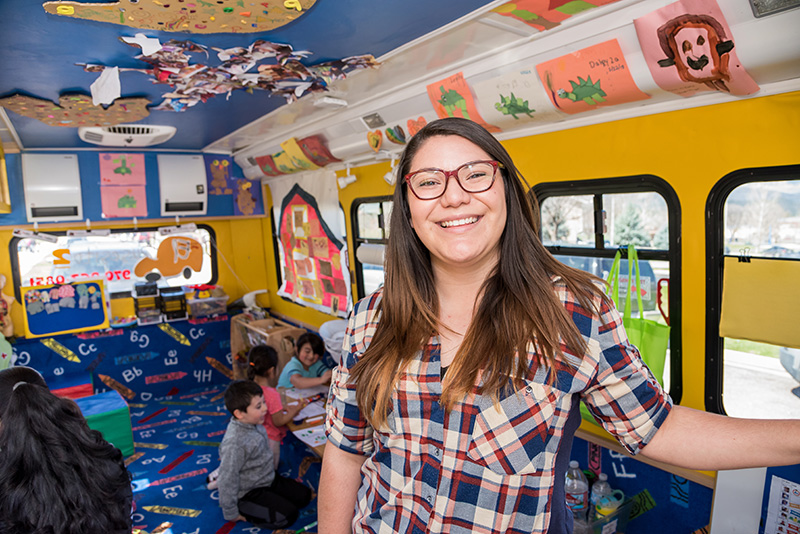
Karla Reyes started as an assistant teacher in 2015, managed Learning with Love and is now manager of the Busesito program.
“I love working with this Latino community that I’m from and being able to provide such a special experience for our kiddos,” Reyes says. “What other preschool program will have two bilingual teachers greeting the children’s parents in the language they speak freely and making them feel so welcome?”
She adds, “We definitely have challenges with having such a unique classroom setup (Can you say starting four buses in sub-zero weather?), but we’re breaking down barriers,” she says. “And if that’s what it takes to get our children into preschool and learning before they walk into their kindergarten classroom, it’s definitely worth whatever it takes.”
Pinela, director of Programs and Innovation, started as a babysitter when one of the community organizers mentioned “this awesome program called Parent Mentor” that needed people to watch their smaller children while they were volunteering at the elementary school. That quickly evolved into becoming a community organizer (“They said they would train me to go out and talk to people. I said, ‘My God, I’m a Latina, I’m great at that!’”) and ultimately being responsible for leading Family, Friends and Neighbors, Family Support Team and the Alma program.
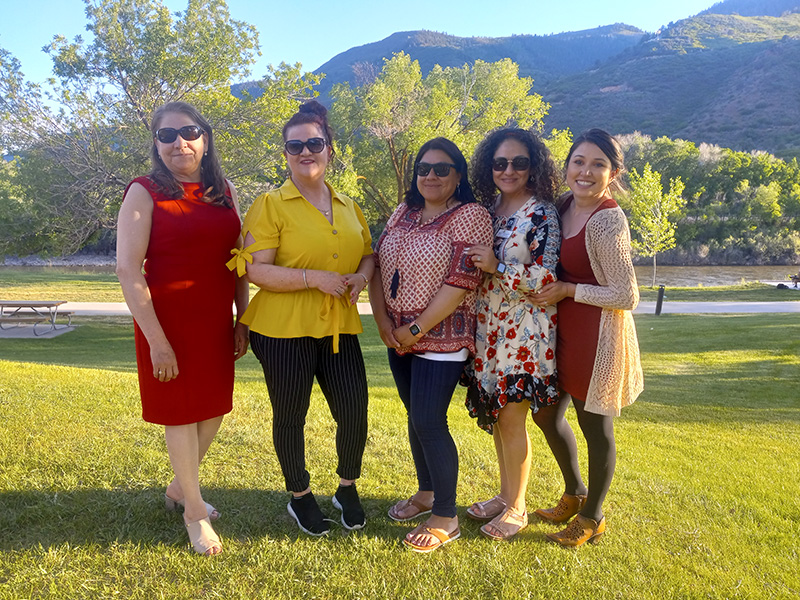
“One of the unique values of Valley Settlement is seeing people’s abilities and potential,” Pinela says. “When you apply for a job, (prospective employers) often want to know where you went to school and what your credentials are. Here, they always see something in you that you don’t even see in yourself.”
In looking at what’s next for the organization, the process is by now familiar. The staff—all the staff, from directors to teachers to anyone on the program staff—will get together and start knocking on doors.
“We don’t recruit for any specific program,” Reyes says, “because sometimes you might knock on the door and the family doesn’t have a kiddo from 3 to 5, but they might be interested in adult education or another program.
“It’s been neat to see each of our programs evolving from this beginning to the stage they’re in now,” she says. “Our process is to always do our best for our community and if something isn’t working, let’s figure out a solution.”
The Valley Settlement way.

K.C. Compton
K.C. Compton worked as a reporter, editor and columnist for newspapers throughout the Rocky Mountain region for 20 years before moving to the Kansas City area as an editor for Mother Earth News. She has been in Seattle since 2016, enjoying life as a freelance and contract writer and editor.






